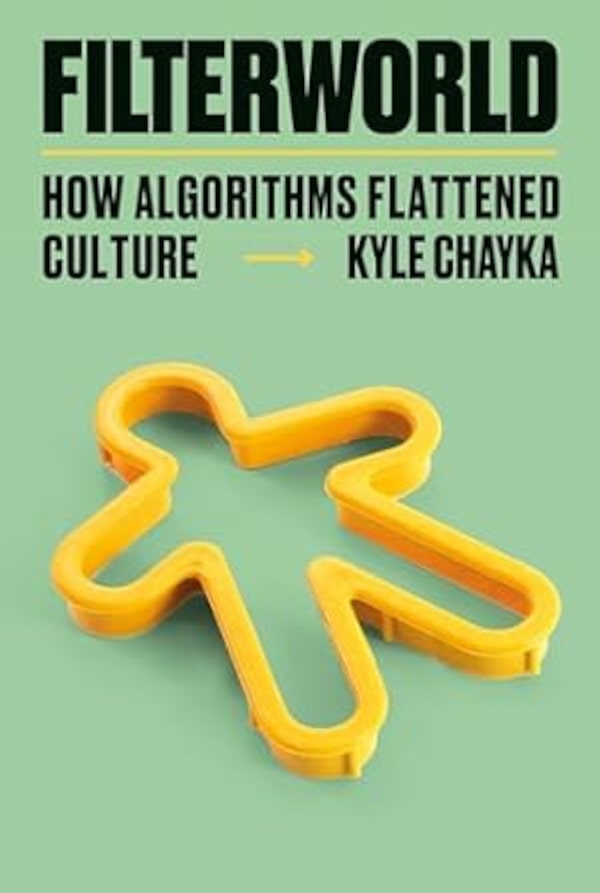
Author Kyle Chayka.Gregory Gentert/Handout
- Title: Filterworld: How Algorithms Flattened Culture
- Author: Kyle Chayka
- Genre: Non-Fiction
- Publisher: Doubleday
- Pages: 304
Recently, my friend Erica told me that she “hated the algorithm.” At nine months pregnant, Erica used Spotify’s Made For You feature to create a playlist that would set the mood when she goes into labour. Made For You compiles personalized playlists for users based on their music preferences. But Spotify was repeatedly – almost exclusively – recommending a small (and boring) selection of country songs. Sure, Erica went through a country phase, but she was after a broader range of songs spanning genres, artists and eras – not just “the same 14 songs.” “Why even have Spotify any more?” she told me. “I need new songs, and even old songs that I stopped listening to, but Spotify isn’t feeding me them.” Eventually, Erica went old school, and built a playlist by scouring her song library and other users’ curated playlists for a well-rounded mix of bygone anthems and new hits.
Books we're reading and loving this week: Globe staffers and readers share their book picks
In his new book, Filterworld, Kyle Chayka demystifies how these all-powerful social-media algorithms have replaced human tastemakers to become the primary lever (and dictator) of global uniform culture. He calls these interconnected, expansive networks of algorithms on Facebook, Instagram, Twitter and TikTok “Filterworld,” which prescribes what we watch, read, listen to, where we eat and even travel to.

Handout
Chayka, a staff writer at The New Yorker who pens a column about the internet and digital culture, weaves together reporting, personal anecdotes, interviews and cultural theory for an insightful and illuminating read on how the internet has encroached upon our time, taste and wallets. (Remember that family in Guelph, Ont., who ditched their devices to live like they were in 1986 for a year? This book explains why.)
Around 2015, platforms such as Facebook, Twitter and Instagram began switching over their feeds from chronological to algorithmic, changing the way content was filtered and recommended to users, to “ruthlessly capitalist, expansionary” ends. Chayka explains how this momentous shift drew the fault lines between the content the algorithm rewards with virality and what gets deprioritized, buried. “Filterworld can be fascistic,” he observes. Algorithmic feeds force content into templates, “a bracketing of reality that is then fulfilled by users creating content that fits the mold.”
Both content creators and consumer are familiar with these templates, which evolve with Silicon Valley’s profit motives to monetize your attention at all costs. Book sales, for example, regrettably rely on a book’s viral popularity on BookTok – TikTok’s literary community. In this environment, “books are popularized less as texts to read than as purchasable lifestyle accessories, visual symbols of an identity.” The algorithm favours the accessible and commercial over the complex and challenging. One isn’t superior to the other, but Filterworld, contrary to social media’s promise of “democratization,” blocks our ability to discover the latter and to cultivate personal taste outside of the former. It’s why, Chayka evinces, most specialty coffee shops from Toronto to Tokyo have adopted a generic minimalist aesthetic: it’s Instagram-friendly. It also explains the rise of “Instapoets” – poets whose literal, digestible work overshadows the obscure, figurative work that, today, rarely finds an audience outside of the niche literary world. This process compresses culture into content, “designed to produce a sensory void or to be flattened into the background life, an insidious degradation of the status of art into something more like wallpaper.”
Vox writer Rebecca Jennings recently tweeted her thoughts on why contemporary culture feels so hollow and homogenous, sapped of creative juice in service of algorithmic virality. “So much of the current cultural discourse and lack of media literacy boils down to the fact that most of the media we used to consume was made by professional creatives, and now the majority of what we read/watch is done by amateurs.”
The stakes of regulating Filterworld are far higher than debating the literary merits of Instagram poetry or whether social media helps us unearth our personal style (a popular myth in marketing copy.) Algorithmic feeds can accelerate radicalization and worsen mental illness. In 2017, a British teenager named Molly Russell took her own life after her Pinterest and Instagram feeds were flooded with content related to suicide and depression.
Filterworld is a timely interrogation of how the Internet dictates our cultural taste and consumption patterns. Chayka reifies how a machine-curated world constricts the human experience, molds us into consumer zombies, and underpins the alienation and disconnection so endemic among people who hang out online. So mostly everyone, but especially people young enough to remember dial-up and DVDs.
So, how can we escape Filterworld? Chayka puts the onus on us to actively seek out human curators. We should try to resist the diktats of our feeds, he says, which feels both too easy and easier said than done. This is the driving force behind platforms like Letterboxd or the newly launched PI.FYI: to allow niche taste communities to sharing their cultural recommendations free of the algorithm’s grip.
Above all else, Filterworld makes one thing crystal clear: the algorithm hates you, too.